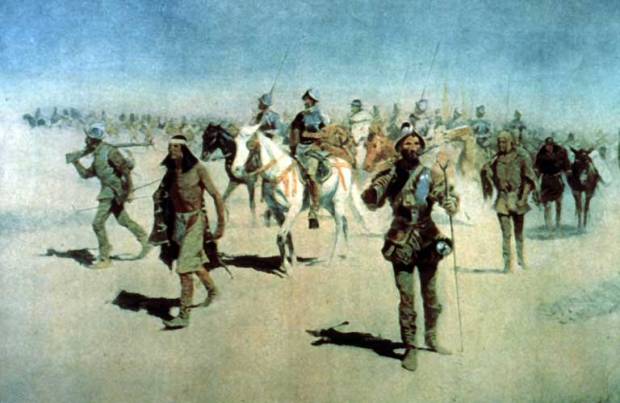
“Coronado sets out for the north” by Frederic Remington, oil painting, circa 1890-1900. (Credit: Wikimedia Commons)
(Donald Trump is hollering that “caravans of immigrants” are headed for the US border. He threatens to suspend both DACA and NAFTA in retaliation.
We know our president does not know very much, and does not care to know. But just so we remember who we are and where we came from, I offer the following from my Stories of the Conquest of the Kingdom of New Mexico. The passage is written with apologies to Ray Bradbury and his much admired The Martian Chronicles.)
In the time of the Spring equinox, when the red, liquid moisture of the earth gives way to golden sunshine, the settlers gathered on the far banks of the river for a final prayer. Commanding the army was Governor, Captain General and Adelantado Juan de Oñate. With him were his son, 12 year old Cristóbal; his nephew and field marshal, Juan de Zaldívar; his other nephew and sergeant mayor, Vicente; 129 Spanish soldiers and their families; a large, unrecorded number of Indians and black slaves; and a poet by the name of Gaspar Pérez de Villagrá, of medium height, 30 years of age, a native of Puebla de los Angeles, a bachelor of arts from Salamanca, and a Captain in the first colonizing expedition to the Kingdom of New Mexico (1598).
At the sight of the Great River, a cloud of sorrows settled on their hearts and pierced them with seven swords: the sword of families disappearing; the sword of countries which did not want them; the jeweled sword of memory of a little girl with bright blue eyes; the echoing sword of sounds of houses in which they were born; the sword of friends forgotten; the sword of comfort vanished; the sword of realms of the mind never experienced, left behind.
Like to the waxing moon growing to full, lighting up the sky in glory and splendor, so the army marched forth to the applause of all with a screeching of cart wheels. Eighty wagons loaded with stores and ammunition led the way. Oxen followed in column on the wheel tracks they laid across the river bed. Then goats, sheep, mares, horses, a great herd of swine, and a dark cloud of dust.
They came because they had been told what to do and what not to do, what to think and what not to think. They came because the spirit moved them into the mystery of a shrouded wilderness. Some came seeking a cleaner life to lead, a purer wind to breathe. Others came looking to confront the minotaur that lived in the caverns of their souls. Still others came merely as if on a picnic, seeking gold. Because they loved adventure, because the conquest of kingdoms was in their blood, they had the certainty that they would find something. They understood that all they owned in the world was in their wagons, but they had faith in a God they had never seen, and they believed that the spirit warrior Santiago would be with them in battle.
When the land across the river became the place that they were, they huddled close together as if fear of the unknown and anxiety for the future could be reduced by proximity, by touching the hands of loved ones. Silently they remembered all those who had come before them. For they brought the souls of all their dead with them, and a well of images from a distant past which named the land and conquered it for the first time. The young would always remember the sights of that day. The old never ceased to look back, and never really left the old world although they came.
OG
OG, you’ve probably read it already, but for those who haven’t I present Lawrence Ferlinghetti’s poem written in his 98th year titled “Trump’s Trojan Horse”:
Homer didn’t live long enough
To tell of Trump’s Trojan Horse
From which all the president’s men
Burst out in the White House to destroy democracy
And institute absolute rule by corporations
Bow down, oh Common Man
Bow down!
I thank you, Oscar, for the power of your words.
LikeLike